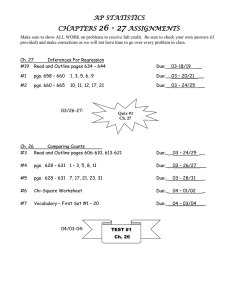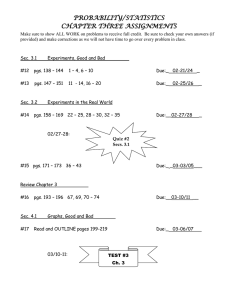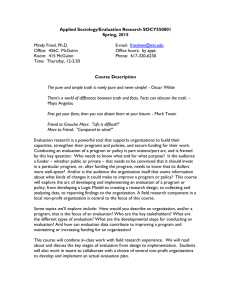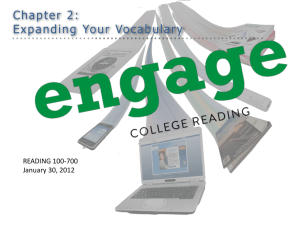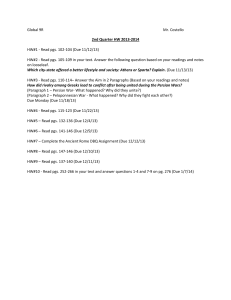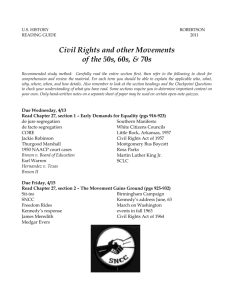Applied Sociology/Evaluation Research SOCY550801 Spring, 2016 Mindy Fried, Ph.D.
advertisement
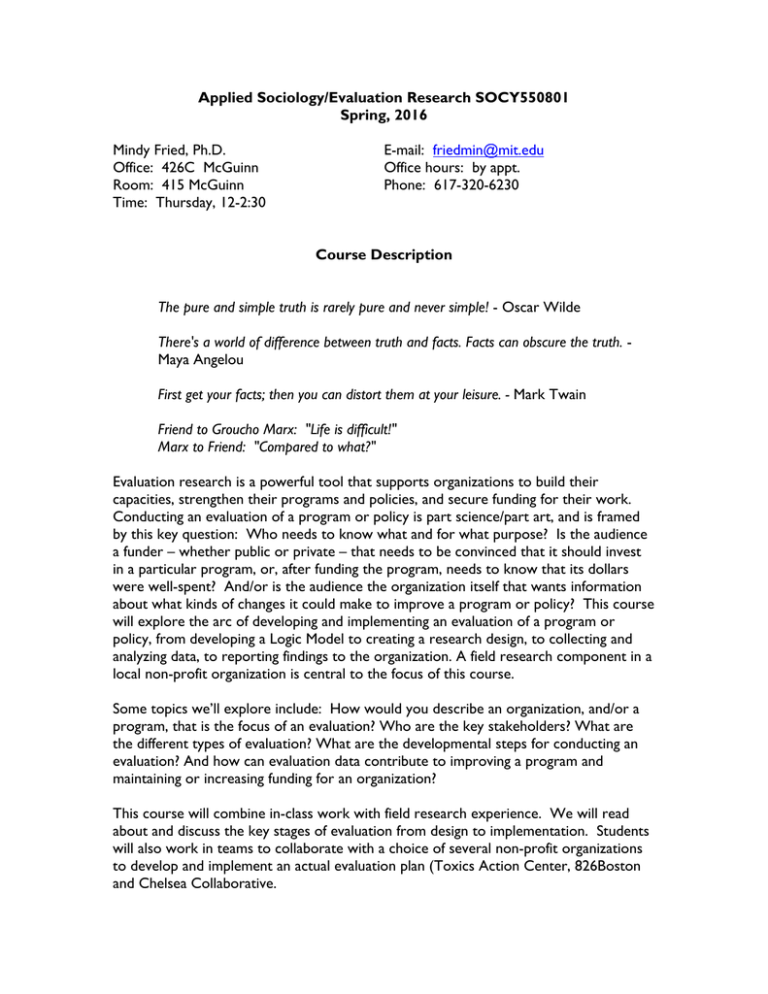
Applied Sociology/Evaluation Research SOCY550801 Spring, 2016 Mindy Fried, Ph.D. Office: 426C McGuinn Room: 415 McGuinn Time: Thursday, 12-2:30 E-mail: friedmin@mit.edu Office hours: by appt. Phone: 617-320-6230 Course Description The pure and simple truth is rarely pure and never simple! - Oscar Wilde There's a world of difference between truth and facts. Facts can obscure the truth. Maya Angelou First get your facts; then you can distort them at your leisure. - Mark Twain Friend to Groucho Marx: "Life is difficult!" Marx to Friend: "Compared to what?" Evaluation research is a powerful tool that supports organizations to build their capacities, strengthen their programs and policies, and secure funding for their work. Conducting an evaluation of a program or policy is part science/part art, and is framed by this key question: Who needs to know what and for what purpose? Is the audience a funder – whether public or private – that needs to be convinced that it should invest in a particular program, or, after funding the program, needs to know that its dollars were well-spent? And/or is the audience the organization itself that wants information about what kinds of changes it could make to improve a program or policy? This course will explore the arc of developing and implementing an evaluation of a program or policy, from developing a Logic Model to creating a research design, to collecting and analyzing data, to reporting findings to the organization. A field research component in a local non-profit organization is central to the focus of this course. Some topics we’ll explore include: How would you describe an organization, and/or a program, that is the focus of an evaluation? Who are the key stakeholders? What are the different types of evaluation? What are the developmental steps for conducting an evaluation? And how can evaluation data contribute to improving a program and maintaining or increasing funding for an organization? This course will combine in-class work with field research experience. We will read about and discuss the key stages of evaluation from design to implementation. Students will also work in teams to collaborate with a choice of several non-profit organizations to develop and implement an actual evaluation plan (Toxics Action Center, 826Boston and Chelsea Collaborative. Course Learning Objectives At the conclusion of this course, students will be able to: 1. Understanding the language of program evaluation 2. Differentiate between formative, process, and outcome evaluation 3. Develop a program logic model – or theory of change – that articulates “inputs” and “outputs” and how they relate to a program’s short-term, intermediate and long-term outcomes 4. Identify indicators of success in achieving program goals (e.g., tangible markers that let you know program has achieved success) 5. Understand issues of cultural competence in evaluation 6. Identify key research questions as they relate to field research evaluation 7. Identify appropriate data sources for program evaluation 8. Create evaluation plan for field research evaluation, including data collection strategies. Course Requirements The tenor of this class will be one of openness and non-judgment, in which students will be learning a set of new skills and applying them directly with an organization. All students will be required to participate in a field evaluation research project. This experience is central to the course design and students’ learning experience. There is a lot of responsibility students will have in their work with the organization they select, and this must be taken seriously. At the same time, the class will act as a “lab” where students can discuss, problem-solve and receive feedback from their peers and the instructor, without fear that “not knowing” will affect their grades. Mistakes are part of the learning process. All draft assignments are graded based on concerted effort and intention. Final assignments are graded. The goal is to help each student have a successful experience working with their “client” on developing the elements of an evaluation plan. Students will form teams and select a field research site (3 options). Much of the work will be done independent of their organization, but you will also work closely with a key staffer from your field research site, which will involve visiting the organization 2-3 times during the semester, for meetings, observation, etc., as well as email exchange and possibly phone contact. The class will progress through the process of developing an evaluation plan, including gaining knowledge about the organization/program you’re working with, the development of a Logic Model (or Theory of Change) and indicators, the development of evaluation research questions, the identification of data sources, research methods, and a sample qualitative research protocol and sample survey. Your ultimate deliverable for the class will be a completed evaluation plan, incorporating the above items, which the “client” can use as a jumping-off point to conduct an evaluation, if they so choose. 2 Course grades Assignment Due by % of grade Class participation 1 Draft program and stakeholder description* Stakeholder interview report* Draft evaluation purpose statement* Draft program logic model and indicators* Data source assignment* Key questions* Draft focus group guide* Draft survey instrument* NA 2/9 20 3 2/23 2/23 3 9 3/1 5 3/15 3/15 3/29 4/5 5 5 5 5 Evaluation Plan PPT 4/12 and 4/19 5 Final evaluation plan Total 2 5/3 35 100 Required Readings Course text and materials: • Rossi, P.H., Lipsey, M.W. and Freeman, H.E. (2004). Evaluation: A Systematic Approach, 7th edition. Thousand Oaks, CA: Sage. • Additional readings provided by the instructor on the Canvas site for this class. January 19 – Introduction to Evaluation Research • Introduction to the syllabus • Overview of program evaluation paradigms and ways of knowing • Introduction of Mellon-Mays evaluation Not based on what you say, but that you are engaged and participate in the discussion/dialogue. 2 All draft items should be finalized and incorporated as appropriate into the Final Evaluation Plan. *All items with an asterisk are graded based on intention and effort, as these drafts are a part of the learning process. 1 3 Following is the general timetable for class topics and assignments. Given the pace of the class, we may choose to take more time on a particular topic, in which case, class assignments will adapted accordingly. January 26 – Overview of evaluation research Overview of program evaluation Textbook readings: • Rossi, Lipsey and Freeman: Chapter 1, Overview of program evaluation, pgs. 130, and Chapter 2, Tailoring evaluation, pgs 31-66. Comparing Research and Program Evaluation • US Department of Health and Human Services Centers For Disease Control and Prevention. Introduction to program evaluation for public health programs: A self-study guide. Atlanta, Georgia: Centers for Disease Control And Prevention, 2011. Pgs 1-7 http://www.cdc.gov/eval/guide/CDCEvalManual.pdf Case study reading: Evaluation of Mellon-Mays Undergraduate Fellows Program by Brad Rose, Ph.D. http://bradroseconsulting.com/wp-content/uploads/2012/10/MMUF-Program-Review.pdf History of program: http://www.mmuf.org/about/history Experiential: Critique evaluation of the Mellon Mays Undergraduate Fellowship Program February 2 – Getting grounded in field research: Chelsea Collaborative, Toxics Action Center and 826Boston Readings: • Rossi, Lipsey and Freeman: Chapter 2, Tailoring Evaluations, pgs 31-65. Readings – review websites of the 3 field research sites, including reports: http://chelseacollab.org/, http://massclu.org/, and http://www.vsamass.org/ Readings: • Web-based and other materials re: chosen field research site, including: - reports/papers - program descriptions - target population/s - key staff and board members - funding sources • CDC Guidebook, pgs 14-25 4 Panel presentation: • Chelsea Collaborative • Toxics Action Center • 826Boston February 9: Stakeholders, formulating questions and assessing needs Readings: • Rossi, Lipsey and Freeman: Chapter 3, Identifying issues and formulating questions, pgs. 67-99, and Chapter 4, Assessing the need for a program, pgs 101132 • Chapter Two: Bryson, John and Michael Patton, Analyzing and Engaging Stakeholders, pgs 30-35 • Case study: http://arborcp.com/articles/Feminization%20of%20AIDvignetteMF.pdf Program: We-Act: http://www.we-actx.org/programs/incomegereration_cooperatives/ In-class: What kinds of evaluation questions would you ask to assess the extent to which the We-Act program is addressing the needs of women and girls with HIV/AIDS in Sub-Saharan Africa? Who/what are your data sources that will allow you to answer these questions? Assignment #1 due: Draft program and stakeholder description * Note: Schedule stakeholder interviews (report due 2/16) February 16 – Theory-based evaluation Readings: Theory-based evaluation • Rossi, Lipsey and Freeman: Chapter 5: Expressing and assessing program theory, pgs. 133-168, and Chapter 6, Assessing and monitoring program process, pgs. 169-201 • W.K.Kellogg Foundation (2004). Using Logic Models to Bring Together Planning, Evaluation, and Action: Logic Model Development Guide. Chapters 1-3 (pgs. 134. • Executive Summary, Evaluation of Community Mobilization Initiative Experiential: Development of Theory of Change related to field research organizations 5 February 23 – Cultural competence in evaluation (need to reschedule for other day/evening session) American Evaluation Association.(2011). Public Statement on Cultural Competence in Evaluation. Fairhaven, MA: Author.Retrieved from www.eval.org. Cultural Competence in Evaluation, in Strategic Evaluation (9/7/2011) by Katrina L. Bledsoe, Ph.D., Education Development Center, Inc. http://www.fsg.org/KnowledgeExchange/Blogs/StrategicEvaluation/PostID/159.aspx Rodney Hopson, Ph.D., (2003)Duquesne University with Social Policy Research Associates. Overview of Multicultural and Culturally Competent Program Evaluation: Issues, Challenges and Opportunities, Oakland, CA. http://www.calendow.org/uploadedFiles/Publications/Evaluation/Multicultural_Health_Ev aluation/OverviewBook.pdf Speaker: TBA Assignment #2 due: Stakeholder interview report Assignment #3 due: Draft evaluation purpose March 1 – Types of evaluation: formative, process and summative Formative and process evaluation Readings: • Rossi, Lipsey and Freeman: Chapter 6, pgs 169-202 • Case study: PHH/PRC Process evaluation report Impact and outcome evaluation Reading: • Rossi, Lipsey and Freeman, chapter 7, pgs 203-232. • Patton, Michael (2010), Utilization-Focused Evaluation, in Segone, Marco, Editor, From policies to results: Developing capacities for country monitoring and evaluation systems, pgs 252-277. Readings: Choosing/defining indicators • CDC Manual, pgs 56-59 • Kellogg, pgs 52-55 Developmental evaluation (DE) Hallie Preskill and Tanya Beer, Evaluating Social Innovation, pgs 2-10 http://www.evaluationinnovation.org/sites/default/files/EvaluatingSocialInnovation.pdf 6 Experiential: Student presentations and consultations Assignment #4 due: Draft program logic model and indicators March 8: NO CLASS March 15: Evaluation design: qualitative research in evaluation Readings: • Lofland, John et al, Analyzing Social Settings: A Guide to Qualitative Research: http://isites.harvard.edu/fs/docs/icb.topic536759.files/lofland_lofland.pdf • Grounded theory, Anselm and Strauss http://www.educ.ttu.edu/uploadedfiles/personnel-folder/lee-duemer/epsy5382/documents/grounded%20theory%20methodology.pdf • Research Methods Data Base, William M.K. Trochim http://www.socialresearchmethods.net/kb/qual.php • Triangulation: Establishing the Validity of Qualitative Studies, Lisa A. Guion, David C. Diehl, and Debra McDonald: http://edis.ifas.ufl.edu/pdffiles/fy/fy39400.pdf • Excerpts on interviewing from Learning From Strangers, by Robert Weiss (1994)??? Assignment #5 and #6 due: Data sources and key questions March 22: Analysis of Qualitative Research Data Readings: TBA March 29: Evaluation design: Quantitative Research Readings: • Wholey, pgs 262-297 – Using surveys • Wholey, pgs 353-362 – Conducting surveys on the internet Speaker: Valerie Cooley, Ph.D. Brown University Assignments #7 due: Draft focus group guide April 5: Special Topics: Participatory evaluation Readings: • Community Toolbox: Participatory Evaluation. http://ctb.ku.edu/en/table-of-contents/evaluate/evaluation/participatoryevaluation/main April 12: Special Topics - TBA Assignment #8 due: Draft survey instruments April 19 – Student presentations Assignment #9 due: Evaluation PPT 7 April 26 – Student presentations Assignment #9 due: Evaluation PPT May 3 – Final Class FINAL EVALUATION PLAN due COURSE REQUIREMENTS All the assignments, except attendance and participation, reflect stages in the development of an evaluation plan. Overall, these assignments require collaborative team-work. Before you dive into doing an assignment, please divvy up the tasks in the assignment and be deliberate about who is doing what. In producing a collaborative piece of work, allow yourself enough time to review your sections. I encourage you to support one another to create the best deliverable, but please do not write one another’s section of the assignment. For the smaller assignments, you must all still be involved, whether in the conceptualization stage, the research stage or the writing stage. Please include a one-page cover page that outlines how you have divvied up your labor. Attendance and Participation The success of this course is dependent on ongoing, active student engagement. Because of the centrality of active class participation, you are expected to attend every class period. Your absence would be missed by all, since your presence is critical for the lively exchange of ideas. Attendance is taken into consideration in figuring your Class Participation grade. (Participation accounts for 20% of your grade. Excessive absences missing more than two classes - will negatively affect your overall grade.) #1: Write draft program and stakeholder description This should be a substantive 2-3 page paper (double-spaced), providing enough information in the following areas to allow the reader to fully understand the program you propose to evaluate: • Community the program serves • 2-3 paragraph literature review regarding the need for the program • Program goals • Program setting • Stakeholders • Intervention design • Any prior formative or summative evaluation conducted on the program #2: Write draft evaluation purpose statement This should be a well-written and clear summary of the specific goals of this evaluation. This is different from the goals of the program that you are evaluating. The reader 8 should be able to understand why the evaluation is being conducted, what information the evaluation will provide, and how that information may be used. #3: Stakeholder interview report In order to get fully grounded in the work of your organization, and the program of focus for your research, you will conduct semi-structured interviews with key stakeholders from your organization (each student on a team should conduct one interview). This may include: staffers, a board member, clients/consumers of services. You will write a 2-3 page report summarizing the results of your interviews. The purpose of these interviews is to help you get more grounded in how the organization functions, and what stakeholders would like to learn as a result of an evaluation. This is not to make promises about what you will do; rather, it is to allow you to learn more from stakeholders and get a better sense of what you might be able to do for them in developing your evaluation plan. #4: Develop a draft logic model or theory of change for your organization. Develop a Logic Model (or Theory of Change) schemata that details the program inputs/resources, assumptions, intended activities, and the expected short-, intermediate, and long-term outcomes. Put some real time and thought into this, so the “logic” makes sense (e.g., the interim outcomes represent a thoughtful representation of how outcomes interact to produce long-term outcomes). #5: Data source report AND key questions Based on your evaluation research questions, write a report that outlines where you will collect your data, in order to answer your key research questions. #6: Draft survey instrument Design a 10-item closed-ended survey, including appropriate demographic items that are relevant to your evaluation. Prior to designing the survey, identify to whom the survey will be administered, and what method you’ll use to administer it, based on characteristics of the target population. #7: Draft one individual interview guide and one focus group interview guide Design a 6-10 item individual interview guide, and a 6-10 item focus group interview guide, including key questions and probes relevant to your evaluation plan. Prior to designing the guides, determine which subjects will be participating in the interview. Divide this task among team members (1/2 on each guide). Approach writing the guides with the individual or group in mind, and imagine how the actual conversations will go, in order to inform warm-up questions and the flow of the interview itself. Given that you will be doing these two guides as a collaborative endeavor with your team, consult with one another to ensure that both guides are complementary and will produce needed overall information for the evaluation. 9 #8: Final Evaluation Plan Your final evaluation plan should incorporate all the material produced in the previous assignments, but the draft items should now be in final form, incorporating any changes/suggestions from the instructor and peers. The evaluation plan should: • • • • • Reflect a clear understanding of the organization and the program you’re working with. Reflect a clear understanding of your evaluation questions, based on conversations with the “client”. Include a logic model or theory of change (TOC) that reflects the goals for the programs (or maybe more broadly, the organizational goals) the organization is trying to achieve, the “inputs” or elements of the program, the more immediate goals (which may also be the most reasonable goals to measure, depending on the program/org), and the longer-term goals. You will develop this logic model/TOC based on your conversations with your “client” and extensive review of materials provided. Include “indicators” or measures that provide signs that the goal is being achieved. Include key research questions, data sources (who has the answers to those questions, from their perspective), research methods (e.g., survey, interviews/focus groups, material review, participant observation), and possibly a sample survey. #9: Evaluation PPT Develop a brief PPT presentation that you will present to class. This PPT will allow your classmates to understand and review the elements of your final evaluation plan, and will be the culmination of all of your work. FINALLY – Please review important information below: Collaboration policy: This course requires a great deal of collaboration. Please include a cover page in all collaborative work, delineating how the labor was divided. Laptop/electronic device policy: Laptops, tablets and electronic reading devices are permitted in class for the sole purpose of consulting class materials or taking notes. Use of e-mail, web surfing, Facebook, texting etc. and any work related to other classes is not permitted. Use of cell phones is not permitted without permission of instructor. For privacy purposes, video or audio taping in class is not permitted. Student Disability Policy: If you are a student with a documented disability seeking reasonable accommodations in this course, please contact Kathy Duggan, (617) 5528093, at the Connors Family Learning Center regarding learning disabilities, or Paulette 10 Durrett, (617) 552-3470, in the Disability Services Office regarding all other types of disabilities. Policy on academic integrity. Plagiarism and other forms of academic dishonesty are serious offenses. Please become familiar with BC’s policies and guidelines on academic integrity: http://www.bc.edu/offices/stserv/academic/integrity.html I LOOK FORWARD TO WORKING WITH YOU THIS SEMESTER! 11
